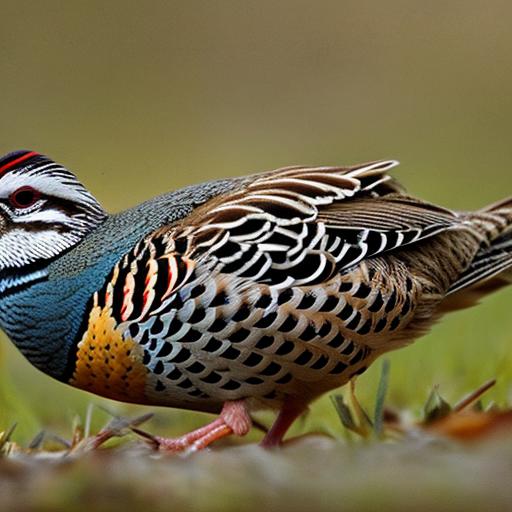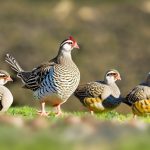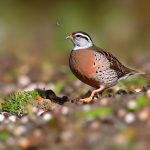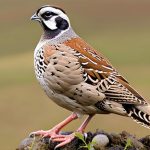When it comes to choosing the right quail species for your quail farm, there are several factors to consider. The most common quail species for farming are the Coturnix quail, also known as Japanese quail, and the Bobwhite quail. Coturnix quail are known for their fast growth rate, high egg production, and ease of care, making them a popular choice for beginners. On the other hand, Bobwhite quail are native to North America and are known for their delicious meat and adaptability to various climates.
Coturnix quail come in a variety of colors, including brown, white, and tuxedo, while Bobwhite quail have a distinct white and black striped pattern on their feathers. When choosing a quail species, it’s important to consider your specific goals for your quail farm. If you’re primarily interested in egg production, Coturnix quail may be the best choice for you. However, if you’re looking to raise quail for meat, Bobwhite quail may be a better option. Additionally, consider the climate and environment in which you’ll be raising your quail, as different species may have different requirements for temperature and humidity.
In conclusion, when choosing the right quail species for your farm, consider factors such as your goals for the farm, the climate and environment in which you’ll be raising the quail, and the specific characteristics of each species. By carefully considering these factors, you can choose the quail species that is best suited to your needs and set yourself up for success in your quail farming venture.
Key Takeaways
- Choose the right quail species based on your specific needs and environment
- Set up a quail enclosure with proper space, bedding, and protection from predators
- Provide proper nutrition for quails including a balanced diet of seeds, grains, and insects
- Maintain quail health and hygiene by regularly cleaning the enclosure and monitoring for signs of illness
- Manage quail behavior and social dynamics by providing adequate space and minimizing stress factors
- Collect and incubate quail eggs for hatching, ensuring proper temperature and humidity levels
- Consider selling or processing quail for meat, following local regulations and ethical practices
Setting Up the Quail Enclosure
Setting up a proper enclosure for your quail is essential for their health and well-being. Quails are ground-dwelling birds that require a secure and spacious environment to thrive. When setting up a quail enclosure, consider factors such as space requirements, protection from predators, and environmental conditions.
Quails require at least 1 square foot of space per bird to ensure they have enough room to move around and exhibit natural behaviors. The enclosure should be secure and protected from predators such as raccoons, foxes, and birds of prey. Use sturdy wire mesh or fencing to create a barrier around the enclosure and consider adding a roof to prevent predators from entering from above.
In addition to protection from predators, it’s important to provide environmental enrichment for your quail. This can include natural elements such as branches, logs, and shrubs for them to explore, as well as dust baths for them to keep their feathers clean and healthy. Finally, consider the location of the enclosure in relation to sunlight and shade, as well as access to fresh air and ventilation.
In summary, when setting up a quail enclosure, prioritize factors such as space requirements, protection from predators, environmental enrichment, and access to sunlight and fresh air. By creating a secure and stimulating environment for your quail, you can ensure that they are healthy and happy in their new home.
Providing Proper Nutrition for Quails
Proper nutrition is essential for the health and productivity of your quails. Quails require a balanced diet that includes a combination of commercial feed, fresh water, and occasional treats. When it comes to feeding your quails, it’s important to consider their specific nutritional needs at different stages of life.
For young quails, it’s important to provide a high-protein starter feed to support their rapid growth and development. As they mature, you can transition them to a grower feed that is lower in protein but still provides essential nutrients for their continued growth. Additionally, consider supplementing their diet with fresh greens, fruits, and vegetables to provide added vitamins and minerals.
In addition to providing a balanced diet, it’s important to ensure that your quails have access to clean and fresh water at all times. Quails are sensitive to dehydration and can quickly become ill if they do not have access to water. Consider using nipple drinkers or shallow water dishes to provide water for your quails while minimizing the risk of contamination.
Finally, consider providing occasional treats such as mealworms or cracked corn to supplement their diet and provide enrichment. However, it’s important to offer treats in moderation to prevent nutritional imbalances or overfeeding.
In conclusion, providing proper nutrition for your quails is essential for their health and productivity. By offering a balanced diet of commercial feed, fresh water, and occasional treats, you can ensure that your quails are well-nourished and thriving on your farm.
Maintaining Quail Health and Hygiene
Maintaining the health and hygiene of your quails is essential for preventing disease and ensuring their overall well-being. Regular health checks and good hygiene practices can help you identify and address any potential issues before they become serious problems.
One important aspect of maintaining quail health is monitoring their behavior and appearance for any signs of illness or distress. Look for symptoms such as lethargy, loss of appetite, abnormal droppings, or respiratory issues. Additionally, conduct regular physical exams to check for any injuries or abnormalities in their feathers or skin.
In addition to regular health checks, it’s important to maintain good hygiene practices in the quail enclosure. This includes regularly cleaning and disinfecting the enclosure to prevent the buildup of bacteria and parasites. Remove soiled bedding and droppings on a regular basis and replace with fresh bedding to maintain a clean and dry environment for your quails.
Furthermore, consider implementing biosecurity measures to prevent the introduction of diseases onto your farm. This can include quarantining new birds before introducing them to the existing flock, limiting visitor access to the farm, and practicing good hygiene when handling the birds.
In summary, maintaining quail health and hygiene requires regular health checks, good hygiene practices in the enclosure, and implementing biosecurity measures. By prioritizing these aspects of care, you can help prevent disease and ensure that your quails are healthy and thriving on your farm.
Managing Quail Behavior and Social Dynamics
Understanding and managing quail behavior and social dynamics is essential for maintaining a harmonious flock on your farm. Quails are social birds that have complex social structures and hierarchies within their flocks. By understanding their behavior and social dynamics, you can create an environment that promotes positive interactions among the birds.
One important aspect of managing quail behavior is providing enough space for the birds to establish their own territories within the enclosure. This can help reduce aggression and competition among the birds by giving them enough room to establish their own space. Additionally, providing environmental enrichment such as hiding spots or perches can help reduce stress and promote natural behaviors.
Furthermore, consider the gender ratio within the flock when managing social dynamics. In general, it’s best to maintain a ratio of one male to every three or four females to prevent excessive mating aggression among the males. Additionally, observe the behavior of individual birds within the flock and be prepared to separate any birds that are being excessively aggressive or causing harm to others.
In addition to managing social dynamics within the flock, it’s important to handle the birds gently and calmly to build trust and reduce stress. Avoid sudden movements or loud noises that can startle the birds and be mindful of their individual personalities and preferences.
In conclusion, managing quail behavior and social dynamics requires providing enough space within the enclosure, maintaining a balanced gender ratio within the flock, observing individual behavior, and handling the birds gently. By understanding their behavior and creating a positive environment for them, you can promote harmonious interactions among the birds on your farm.
Collecting and Incubating Quail Eggs
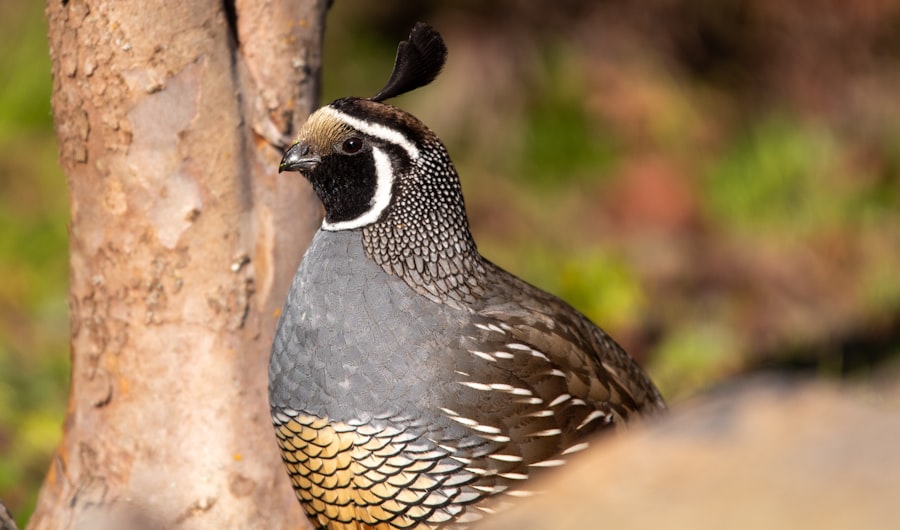
Collecting and incubating quail eggs is an essential part of maintaining a productive flock on your farm. By following proper techniques for collecting and incubating eggs, you can maximize hatch rates and ensure a steady supply of new birds for your farm.
When collecting quail eggs, it’s important to handle them gently to prevent damage to the delicate shells. Use clean hands or gloves when handling the eggs and avoid washing them unless absolutely necessary. Store collected eggs in a cool and humid environment with consistent temperatures until they are ready for incubation.
When it comes to incubating quail eggs, it’s important to use a reliable incubator that maintains consistent temperature and humidity levels. Follow the manufacturer’s instructions for setting up the incubator and monitor temperature and humidity levels closely throughout the incubation period.
Additionally, turning the eggs regularly during incubation is essential for ensuring proper development of the embryos inside. Most incubators have automatic turning mechanisms, but if not, be sure to turn the eggs manually several times a day.
Finally, monitor the development of the embryos by candling the eggs periodically throughout the incubation period. This involves shining a bright light through the egg to observe the development of the embryo inside. Remove any eggs that are infertile or show signs of abnormal development to prevent contamination of the other eggs.
In summary, collecting and incubating quail eggs requires gentle handling during collection, using a reliable incubator with consistent temperature and humidity levels, turning the eggs regularly during incubation, and monitoring embryo development through candling. By following these techniques, you can maximize hatch rates and maintain a healthy flock on your farm.
Selling or Processing Quail for Meat
Once your quails have reached maturity, you may choose to sell them live or process them for meat. Selling live quails can be a profitable venture if there is demand in your area for live birds for pets or breeding purposes. Alternatively, processing quails for meat can provide a sustainable source of income from your farm.
When selling live quails, it’s important to ensure that they are healthy and well-cared for before they are sold or transported. Provide clean water and feed leading up to sale or transport and handle them gently to minimize stress during handling.
If you choose to process quails for meat, it’s important to do so humanely and in compliance with local regulations regarding animal welfare and food safety. Consider investing in proper processing equipment such as a humane killing cone or stun gun to minimize stress on the birds during processing.
Additionally, consider marketing your processed quail meat directly to consumers through farmer’s markets or local restaurants that prioritize locally sourced products. Alternatively, you may choose to sell processed quail meat wholesale to distributors or retailers in your area.
In conclusion, once your quails have reached maturity, you may choose to sell them live or process them for meat as a source of income from your farm. Whether selling live birds or processed meat products, it’s important to prioritize animal welfare and food safety throughout the process.
This includes providing proper housing and nutrition for the quails, as well as following safe and humane processing practices. By prioritizing animal welfare and food safety, you can ensure that your quail farming business is not only profitable but also ethical and sustainable. Additionally, building a reputation for high-quality, safe products will help you attract and retain customers, ultimately contributing to the success of your quail farming venture.
If you’re interested in keeping quails, you may also want to explore the article on creating a functional and comfortable living space for your poultry. Check out this insightful piece on farmhouse chicken coop design and maintenance at Poultry Wizard. It offers valuable tips and ideas that can be adapted for quail housing as well.
FAQs
What are quails?
Quails are small ground-dwelling birds that are often kept for their eggs and meat. They are part of the pheasant family and are known for their distinctive calls and quick movements.
What do quails eat?
Quails are omnivores and eat a variety of foods including seeds, insects, and small plants. In captivity, they can be fed a commercial quail feed as well as fresh greens and protein sources.
How do you keep quails?
Quails can be kept in a variety of housing setups including cages, aviaries, or coops. They require protection from predators, access to clean water, and a balanced diet. They also need space to move around and dust bathe.
How do you care for quail eggs?
Quail eggs should be collected daily and stored in a cool, dry place. They can be eaten just like chicken eggs and are often considered a delicacy due to their small size and rich flavor.
What are the benefits of keeping quails?
Keeping quails can provide a sustainable source of eggs and meat for a household. They are also relatively low maintenance and can be kept in smaller spaces compared to other poultry. Additionally, their eggs are considered to be more nutritious than chicken eggs.
Meet Walter, the feathered-friend fanatic of Florida! Nestled in the sunshine state, Walter struts through life with his feathered companions, clucking his way to happiness. With a coop that’s fancier than a five-star hotel, he’s the Don Juan of the chicken world. When he’s not teaching his hens to do the cha-cha, you’ll find him in a heated debate with his prized rooster, Sir Clucks-a-Lot. Walter’s poultry passion is no yolk; he’s the sunny-side-up guy you never knew you needed in your flock of friends!

